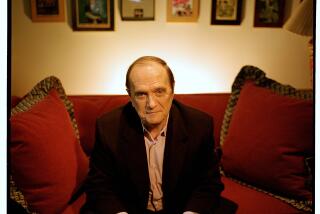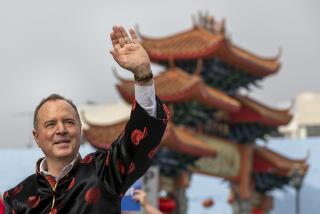Dick Gephardt, Mr. Good & Plenty
- Share via
Researchers have been able to find only one Dick Gephardt joke, and it is not, I should warn you, a thigh-slapper.
Scene: outside an operating room in an Iowa hospital. The doors swing open, and a man who has just had surgery is wheeled out into the corridor. The first person to rush to his side is his wife; the second, a fresh-faced young man with a toothy smile and a highly disciplined haircut. “Hi,” he says, extending his hand, “I’m Dick Gephardt, and I’m running for President.”
It’s not a bad thing to have your industry inspire jokes--even feeble ones like that. Besides being industrious, Richard A. Gephardt, 46, a five-term congressman from Missouri, is earnest, intelligent, likable and well regarded by his House peers, who have elected him chairman of the Democratic Caucus.
Gephardt looks like Hollywood’s idea of a Midwestern congressman--he’s blond as a cornfield, wholesome as an ice-cream social, clean as the dreams of a Methodist congregation. Back in St. Louis, Dick and his wife, Jane, were tagged early as “Ken and Barbie”--a resemblance that could cost him votes in some precincts. In San Francisco recently, a woman was moved to shout, “You’re too perfect!” She won’t be the only one to wonder if this cream puff is tough enough to be President.
In fact, Gephardt is one of the sharpest political operators in Washington. In the House, he is respected as an insider’s insider, a deft hand at tailoring his votes to fit his political necessities, and a man who keeps his word. What makes Gephardt stand out, an aide to a former congressman told me, is that he listens to the other members. “And Dick always laughs at their jokes,” he added. Some of that laughter, you can be sure, is tactical. In an assembly of tumescent talkers, a man who listens and laughs is prized, especially by the droning old mastodons who can advance a young fellow’s career. To suffer bores gladly is a stern test of ambition--one that, by all the evidence, Gephardt has passed. Indeed, if we had a parliamentary system his colleagues would doubtless make Gephardt the prime minister. If he were President we would see the warmest degree of congressional-executive amity since the first year of L.B.J.’s presidency.
The irony of the current campaign is that this quintessential insider is running largely as a populist outsider. His hot issue--and he is the only Democrat to latch onto one--is trade.
“Japan sold $20 billion of automobiles in this country last year,” he said in a recent Iowa debate with Republican presidential candidate Jack Kemp. “Why can’t they buy Iowa beef?” It’s time to “stop worrying about economic theory” and start pressuring countries with which we’ve been running chronic trade imbalances to open their markets to “our products.”
Gephardt has captured the limelight on trade by sponsoring an amendment to pending legislation that would require the President to levy tariffs or impose quotas if, after patient negotiations, the Japanese do not lower their unfair trade barriers and buy more of “our products.” This tough stance (“We can’t be trade patsies any longer”) has earned Gephardt the enmity of what he plausibly stigmatizes as the Establishment, by which he means the editorial boards of our better newspapers and magazines--institutions run by persons trained in graduate school to believe that tariffs beget trade wars that beget depressions.
They may well be right, but a large slice of the wider public, to judge by the polls, agrees with Gephardt that tough action is needed to rectify our historic $160-billion foreign-trade imbalance. When he retails anecdotes about flagrantly unfair Japanese trade practices, ordinary Americans are moved to cheer.
Between World War II and 1973, the average family’s purchasing power doubled, to $28,200. By 1985 it had slipped to $26,400. You can’t blame people, worried about their eroding prosperity, for wanting to restore the time when American-made products were the world’s desire.
“We can’t just clean each other’s clothes and flip hamburgers for each other,” Gephardt said in his debate with Kemp, and across the faces of his Iowa audience (forbidden to applaud until the end of the debate) you could see a ripple of assent.
Being tough on trade has its benefits and risks. It allows Gephardt to be as liberal as the next fellow (Massachusetts Gov. Michael Dukakis, who is neck-and-neck with Gephardt in the polls) on foreign policy and arms control, which a Democrat must be to have a chance of winning the Eastern primaries, while fanning the latent economic nationalism of the Middle West and South--regions with incomes well below the national average.
The trouble with the Gephardt position is that it asks Americans to put their collective interest as producers ahead of their individual interests as consumers sensitive to price increases. Since 1981 the share of what Americans buy that is imported has climbed from 14% to 20%, which means that an awful lot of voters will be responsive to the charge that Gephardt’s amendment (like his oil-import fee) might cost them money.
I listened to excerpts from Gephardt’s debate with Dukakis while driving my German car. I watched his debate with Kemp on a Japanese VCR, stamping my Italian-loafered feet in agreement with his call for solidarity with workers displaced by imports. Clearly we are not only losing the battle for foreign markets; we are also losing the war for our own market. Gephardt may have the wrong target. It isn’t just the Japanese who are to blame for our trade deficit; I’m to blame, and so are you.
Nationalism and solidarity have a powerful emotional resonance. But Walter Mondale made them the center of his 1984 presidential campaign--he was tough on trade, he asked us to think of the plight of manufacturing workers, their families and communities--and it did not help him at the polls. Ronald Reagan beat him with an even more powerful appeal to self-interest: Are you better off today-- not are they better off in Davenport, Iowa?
In a country that gave the world “the me decade,” where self-interest has lately been elevated to a principle (as if we needed encouragement to think of ourselves first), decent Dick Gephardt, asking us to think of the “we” of “me,” has his work cut out for him.
More to Read
Sign up for Essential California
The most important California stories and recommendations in your inbox every morning.
You may occasionally receive promotional content from the Los Angeles Times.










